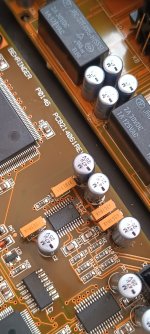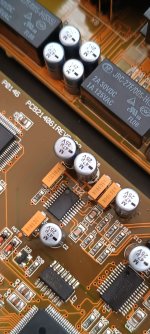I find it hard to believe that any generic X7R ceramic is better/worse than any other except possibly in terms of reliability and flex tolerance. These are used to bypass the supply rails of digital ICs and the important thing is low internal losses at the frequencies of interest.
At most I would replace with appropriate X7R from Kemet, Samsung,Yageo, Vishay or similar. COG/NPO types are available, but will be expensive and likely of no benefit in the application. You do not want film caps for these locations, their construction results in fairly high inductance and very poor performance as bypass capacitors.
MLCC ceramic caps are an excellent choice for the applications where you generally find them, they should not be used in high quality analog circuitry except again for supply decoupling.
Okay, thanks for the advice, I'll follow it. One question: But when you mention MLCC and X7R you mean the same thing?
Is MLCC a family of capacitors in which type X7R is included? Thanks
Yes, MLCC are multi-layer ceramic capacitors. This is usually used to refer to surface mount ceramic capacitors, of which there are various dielectrics like COG/NP0, X7R, X5R, Y5U, etc.
are you even sure the wima are legit? they are one of the most often faked caps in asia and you buying 100 on a whim, without any worry, makes me worry.
Hi, the capacitors are original from guaranteed sources. However, I keep them for future applications. I don't mount them in the deq! 🙄
Today I check what size smd ceramic caps have because anyway I want to replace them with the best ceramic caps that exist on the earth plant hahahah 😀😀
Today I check what size smd ceramic caps have because anyway I want to replace them with the best ceramic caps that exist on the earth plant hahahah 😀😀
Last edited:
Film caps can be useful for decoupling sensitive analog circuitry. That includes clocks, analog PLLs, and audio opamps. Digital circuitry is fine with X7R and that reduces chances of ringing. If parasitic inductance is an issue or concern there are some 805 size SMD film caps that can be used for decoupling. I would consider decoupling to ground fill on the surface so that via inductance is not in the shortest bypass cap current path. Despite the risk of exciting ringing, such caps can sometimes improve sound quality if used selectively. Also, might mention that some of the small SMD film caps can be pricy.
Last edited:
Keep in mind that “best” is only as good as a proper match for the application.
Higher speed circuits, better known as digital, as already mentioned, will thrive on the lowest inductance, lowest esr.
Without knowing what had been chosen originally in each location, and then optimizing each location at a time, with lots of listening time/and or testing for ringing, it’s going to be tough to discern any improvement I would wager. Shotgun cap replacement rarely works, especially when blanket changing part construction.
Higher speed circuits, better known as digital, as already mentioned, will thrive on the lowest inductance, lowest esr.
Without knowing what had been chosen originally in each location, and then optimizing each location at a time, with lots of listening time/and or testing for ringing, it’s going to be tough to discern any improvement I would wager. Shotgun cap replacement rarely works, especially when blanket changing part construction.
Ok, thanks, so this is the list of the type of cap that I would like to use, all MLCC smd 0805 by Kemet:
..or Samsung
https://www.tme.eu/Document/4a42202b32dab16128fe107dd69598cc/samsung-chip-cap.pdf
..or AVX
https://www.tme.eu/Document/667fe6e7748c0ed1675574c6bf64b751/AVX_X7R.pdf
...I have no idea which are the best ...
Chip ADSP-21065L:
+3.3V_Dig: (0805) X7R 100nF 5% 50v
https://www.tme.eu/Document/331c340e8d388c7907daa3af2995db9e/KEM_C1002_X7R_SMD.pdf
Chip ADSP-BF531:
+3.3V_Dig: (0805) X7R 100nF 5% 50v
https://www.tme.eu/Document/331c340e8d388c7907daa3af2995db9e/KEM_C1002_X7R_SMD.pdf
+1.2V_Dig: (0805) X7R 100nF 5% 50v
https://www.tme.eu/Document/331c340e8d388c7907daa3af2995db9e/KEM_C1002_X7R_SMD.pdf
DAC AK4393:

+3.3V_Dig: (0805) X7R 100nF 5% 50v
https://www.tme.eu/Document/331c340e8d388c7907daa3af2995db9e/KEM_C1002_X7R_SMD.pdf
+5.0V_Analog: (0805) X7R 100nF 5% 50v
https://www.tme.eu/Document/331c340e8d388c7907daa3af2995db9e/KEM_C1002_X7R_SMD.pdf
VCOM: (0805) X7R 100nF 5% 50v
https://www.tme.eu/Document/331c340e8d388c7907daa3af2995db9e/KEM_C1002_X7R_SMD.pdf
What is VCOM? I don't understand...
ADC AK5393:

+3.3V_Dig: (0805) X7R 100nF 5% 50v
https://www.tme.eu/Document/331c340e8d388c7907daa3af2995db9e/KEM_C1002_X7R_SMD.pdf
+5.0V_Analog: (0805) X7R 100nF 5% 50v
https://www.tme.eu/Document/331c340e8d388c7907daa3af2995db9e/KEM_C1002_X7R_SMD.pdf
VREFL and VREFR: (0805) X7R 100nF 5% 50v
https://www.tme.eu/Document/331c340e8d388c7907daa3af2995db9e/KEM_C1002_X7R_SMD.pdf
VCOML and VCOMR: (0805) X7R 220nF 5% 50v
https://www.tme.eu/Document/0e782ad52ceef0af32c66441ae02d24a/KEM_C1002_X7R_SMD.pdf
Digital Audio Transceiver AK4114:


+3.3V_Dig: (0805) X7R 100nF 5% 50v
https://www.tme.eu/Document/331c340e8d388c7907daa3af2995db9e/KEM_C1002_X7R_SMD.pdf
+5.0V_Analog: (0805) X7R 100nF 5% 50v
https://www.tme.eu/Document/331c340e8d388c7907daa3af2995db9e/KEM_C1002_X7R_SMD.pdf
VCOM: (0805) X7R 470nF 5% 50V
https://www.tme.eu/Document/e87bb2552b62a528ef0e49022ec38cee/KEM_C1023_X7R_AUTO_SMD.pdf
Audio Codec AK4524:

+3.3V_Dig: (0805) X7R 100nF 5% 50v
https://www.tme.eu/Document/331c340e8d388c7907daa3af2995db9e/KEM_C1002_X7R_SMD.pdf
+5.0V_Analog: (0805) X7R 100nF 5% 50v
https://www.tme.eu/Document/331c340e8d388c7907daa3af2995db9e/KEM_C1002_X7R_SMD.pdf
VREF - AGND: (0805) X7R 100nF 5% 50v
https://www.tme.eu/Document/331c340e8d388c7907daa3af2995db9e/KEM_C1002_X7R_SMD.pdf
DGND - VT: (0805) X7R 100nF 5% 50v
https://www.tme.eu/Document/331c340e8d388c7907daa3af2995db9e/KEM_C1002_X7R_SMD.pdf
They are practically all of the same type. Is it better to use something other than X7R at some point?
On these 2 marked caps (Image below) I have 3.3v.
Could it be that they are part of the DRAM memory?
I ask why I do not know the capacity, to see always identical to 100nF.
Would they also be ideal for X7R here?

😀
..or Samsung
https://www.tme.eu/Document/4a42202b32dab16128fe107dd69598cc/samsung-chip-cap.pdf
..or AVX
https://www.tme.eu/Document/667fe6e7748c0ed1675574c6bf64b751/AVX_X7R.pdf
...I have no idea which are the best ...
Chip ADSP-21065L:
+3.3V_Dig: (0805) X7R 100nF 5% 50v
https://www.tme.eu/Document/331c340e8d388c7907daa3af2995db9e/KEM_C1002_X7R_SMD.pdf
Chip ADSP-BF531:
+3.3V_Dig: (0805) X7R 100nF 5% 50v
https://www.tme.eu/Document/331c340e8d388c7907daa3af2995db9e/KEM_C1002_X7R_SMD.pdf
+1.2V_Dig: (0805) X7R 100nF 5% 50v
https://www.tme.eu/Document/331c340e8d388c7907daa3af2995db9e/KEM_C1002_X7R_SMD.pdf
DAC AK4393:

+3.3V_Dig: (0805) X7R 100nF 5% 50v
https://www.tme.eu/Document/331c340e8d388c7907daa3af2995db9e/KEM_C1002_X7R_SMD.pdf
+5.0V_Analog: (0805) X7R 100nF 5% 50v
https://www.tme.eu/Document/331c340e8d388c7907daa3af2995db9e/KEM_C1002_X7R_SMD.pdf
VCOM: (0805) X7R 100nF 5% 50v
https://www.tme.eu/Document/331c340e8d388c7907daa3af2995db9e/KEM_C1002_X7R_SMD.pdf
What is VCOM? I don't understand...
ADC AK5393:

+3.3V_Dig: (0805) X7R 100nF 5% 50v
https://www.tme.eu/Document/331c340e8d388c7907daa3af2995db9e/KEM_C1002_X7R_SMD.pdf
+5.0V_Analog: (0805) X7R 100nF 5% 50v
https://www.tme.eu/Document/331c340e8d388c7907daa3af2995db9e/KEM_C1002_X7R_SMD.pdf
VREFL and VREFR: (0805) X7R 100nF 5% 50v
https://www.tme.eu/Document/331c340e8d388c7907daa3af2995db9e/KEM_C1002_X7R_SMD.pdf
VCOML and VCOMR: (0805) X7R 220nF 5% 50v
https://www.tme.eu/Document/0e782ad52ceef0af32c66441ae02d24a/KEM_C1002_X7R_SMD.pdf
Digital Audio Transceiver AK4114:


+3.3V_Dig: (0805) X7R 100nF 5% 50v
https://www.tme.eu/Document/331c340e8d388c7907daa3af2995db9e/KEM_C1002_X7R_SMD.pdf
+5.0V_Analog: (0805) X7R 100nF 5% 50v
https://www.tme.eu/Document/331c340e8d388c7907daa3af2995db9e/KEM_C1002_X7R_SMD.pdf
VCOM: (0805) X7R 470nF 5% 50V
https://www.tme.eu/Document/e87bb2552b62a528ef0e49022ec38cee/KEM_C1023_X7R_AUTO_SMD.pdf
Audio Codec AK4524:

+3.3V_Dig: (0805) X7R 100nF 5% 50v
https://www.tme.eu/Document/331c340e8d388c7907daa3af2995db9e/KEM_C1002_X7R_SMD.pdf
+5.0V_Analog: (0805) X7R 100nF 5% 50v
https://www.tme.eu/Document/331c340e8d388c7907daa3af2995db9e/KEM_C1002_X7R_SMD.pdf
VREF - AGND: (0805) X7R 100nF 5% 50v
https://www.tme.eu/Document/331c340e8d388c7907daa3af2995db9e/KEM_C1002_X7R_SMD.pdf
DGND - VT: (0805) X7R 100nF 5% 50v
https://www.tme.eu/Document/331c340e8d388c7907daa3af2995db9e/KEM_C1002_X7R_SMD.pdf
They are practically all of the same type. Is it better to use something other than X7R at some point?
On these 2 marked caps (Image below) I have 3.3v.
Could it be that they are part of the DRAM memory?
I ask why I do not know the capacity, to see always identical to 100nF.
Would they also be ideal for X7R here?

😀
Last edited:
No, X7R are the best all round bypass cap for all but analogue supplies, sometimes even then a lossy ceramic will do well. the lossy nature of X7R makes for less ringing. using higher quality ceramics like c0g and thin film caps (or SMD PPS film caps), are best for series opa feedback filter elements, do to lower noise and higher Q, but you need to choose them judiciously and by measurement.
I tend to use 0508 or 0306 reverse proportion X7R by Murata, for lowest induction.in 1uf as close as possible to the pins.
X7R are the best all round bypass cap for all but analogue supplies, sometimes even then a lossy ceramic will do well. the lossy nature of X7R makes for less ringing.
That is the correct textbook answer, and works great for digital. Doesn't always work so well in practice though, when it comes to analog. In the latter case it must be evaluated experimentally on case by case basis. No peppering around of low ESR RF bypass caps.
agreed. depending on the purpose I may use thin film SMD, pps SMD, polystyrene (PTH, but are available in fairly small packages). you can also get some teflon SMD in unusual RF packages, but these are typically only available up to 10-15pf. the thin film are great, but again, a bit pricey and not typically found in usefully large values. sometimes some very small series resistance, or inductance can help with the uber low impedance if its best avoided for the target circuit.
kyocera avx 100nf deq2496You must be joking?! Or do you seriously want to solder 2.54mm pitch film caps onto 0603 SMD footprints in the digital section? Apart from the technical aspect, simply soldering that will be a frustrating experience.
Edit: 100nF 0603 50V X7R cost less than a cent a piece. For example CL10B104KB8NN from Samsung, I have a full reel of those.
Attachments
- Home
- Source & Line
- Digital Line Level
- Upgrade bad ceramic cap on digital board, any advice?

